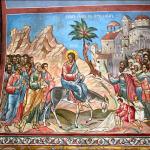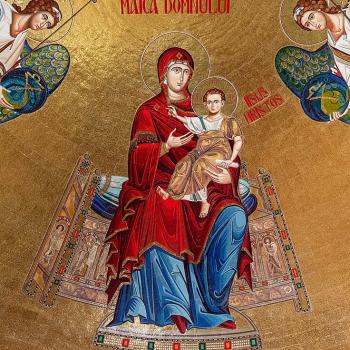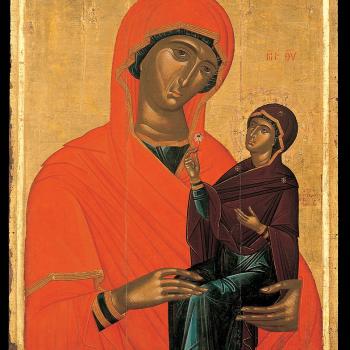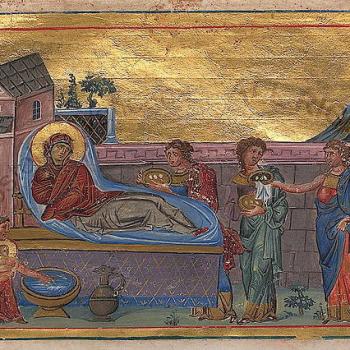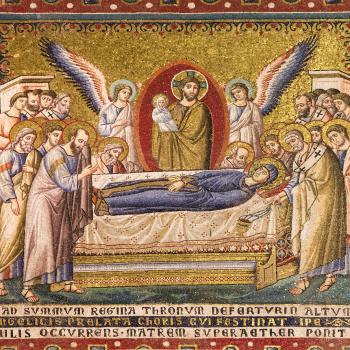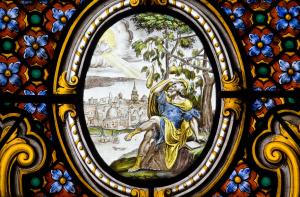
There is something very interesting which happens when Holy Monday, a day on which the Byzantine tradition remembers Jesus’ reaction to the barren fig tree, is celebrated on the same day as that of the Annunciation: we are shown that, contrary to the way some read Jesus’ cursing of the fig tree as indicating that the Jews should be considered accursed because they produced no spiritual fruit, they produced the greatest fruit of all, Jesus himself, even as their whole spiritual tradition led to the coming of Mary, the Theotokos, into the world. Thus, when we read the story in Matthew which explains what happened when Jesus came across a fig tree, we should be careful when we try to interpret its meaning:
In the morning, as he was returning to the city, he was hungry. And seeing a fig tree by the wayside he went to it, and found nothing on it but leaves only. And he said to it, “May no fruit ever come from you again!” And the fig tree withered at once. When the disciples saw it they marveled, saying, “How did the fig tree wither at once?” And Jesus answered them, “Truly, I say to you, if you have faith and never doubt, you will not only do what has been done to the fig tree, but even if you say to this mountain, `Be taken up and cast into the sea,’ it will be done. And whatever you ask in prayer, you will receive, if you have faith” (Matt. 21:18-22 RSV).
The reason why some suggest that this event as representing a condemnation of of Israel, and therefore, of the Jewish tradition, is that Israel is sometimes identified with a fig tree in Scripture (cf. Hos 9:10, Jer. 18:23; Jer. 24). The anti-Semitic interpretation of Matthew, therefore, is that Jesus looked at what Israel has produced, and saw in the end, it produced no fruit, and so all the blessings it had been given would be taken away from them, leaving the Jews accursed. But, when we consider the Annunciation, we are shown this is not true. Mary, Daughter Zion, is the fruit of Israel, and that fruit is so good, so pure, the Holy Spirit overshadowed her and helped her produce even greater fruit, that is, Jesus himself. Thus, we read:
In the sixth month the angel Gabriel was sent from God to a city of Galilee named Nazareth, to a virgin betrothed to a man whose name was Joseph, of the house of David; and the virgin’s name was Mary. And he came to her and said, “Hail, full of grace, the Lord is with you!” (Lk. 1:26-28 RSV).
With the Annunciation, Christians should realize the grace Mary is said to have is the result of God’s long work with Israel, so that if and when Israel is understood as a fig tree, it is proven to be a rather productive tree, and so is not one which God will abandon and cast into the flames. Its success is, indeed, one which verifies the value of Israel itself, a value which is not just to be found only in the past, but for eternity. Israel is not accursed. Jews are not to be treated with contempt, thinking they are cursed by Jesus.
How, then, should we interpret the way Jesus cursed the fig tree? Instead of seeing the fig tree as representing Israel, and therefore, the Jews, we should see it representing each and every person and their own particular spiritual work and accomplishments. We are told that our lives should bear fruit, the fruit of love, and when Jesus comes to us, we should hope he sees that fruit in us and so be welcomed by him in eternity. If we have love, we will be blessed, but if we do not have it, we will not have what we need to connect with the divine life, the life of the God who is love, and so we will spiritually wither away. But, of course, Jesus offers us hope; if we currently do not bear fruit of love and grace, we can repent and change our ways, letting God’s grace into us, so that in and through it, we can be transformed and begin to act in and through love, producing through our work, the fruit of love. Indeed, just like Mary finds Jesus is the fruit of her own love, so we will find we will give birth to Jesus in ourselves, and he will be, like with Mary, the ultimate proof that we have produced the fruit God desires from us. “For he who sanctifies and those who are sanctified have all one origin” (Heb. 2:11a RSV). It is therefore, imperative, we take the story as a personal warning, instead of as a universal condemnation of Israel.
The Annunciation, therefore, shows how and why many are wrong in interpreting the fig true as representing the Jews as a whole. The event, to be sure, is symbolic, but the symbolism must be properly understood and interpreted. God found Israel to be fruitful, and blessed that fruit with Mary. Thus, Israel produced the greatest fruit of all: Mary and Jesus. Similarly, humanity, as a whole, can be said be fruitful, and so not cursed by God, because the incarnation shows that humanity has been fruitful, just as Israel has been. Finally, the incarnation likewise proves that creation itself is fruitful, and so not to be cast away and set for destruction. Rather, in and through Jesus, God takes all that is good in creation and gives it the grace it needs so that it can find its proper place in the kingdom of God. But then, what is unfruitful, what shall be cast away? Sin, and with it, all that is bound to and attached to sin. For sin knows no good fruit, as it knows no love, and so, as long as we are attached to the way of sin, the way of unlove, we risk Jesus coming to see us in the last judgment without the fruit of love, and therefore, being cast where all that is bound to sin will go for eternity.
Stay in touch! Like A Little Bit of Nothing on Facebook.
If you liked what you read, please consider sharing it with your friends and family!
N.B.: While I read comments to moderate them, I rarely respond to them. If I don’t respond to your comment directly, don’t assume I am unthankful for it. I appreciate it. But I want readers to feel free to ask questions, and hopefully, dialogue with each other. I have shared what I wanted to say, though some responses will get a brief reply by me, or, if I find it interesting and something I can engage fully, as the foundation for another post. I have had many posts inspired or improved upon thanks to my readers.


